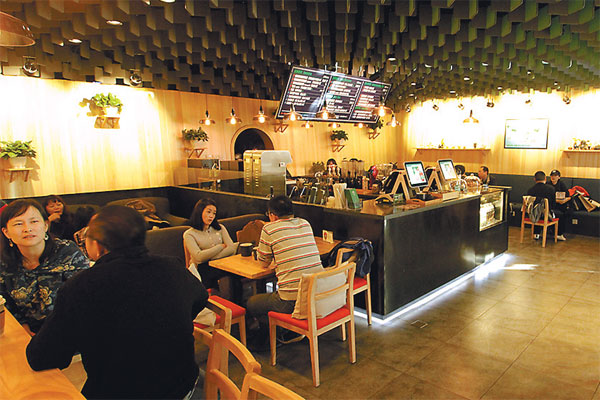

The first time I walked into TNTea I was unsure exactly what I had stumbled across.
The contemporary decor with comfy and inviting sofas screamed out that it could be another of Beijing's hipster hangout coffee houses.
But drinks called the Tellini, Mojitea and the Goji Mary jumped out at me from the menu board above the central bar. For a moment I wondered if I would be swapping my daily caffeine hit for something a little stronger.
 |
|
Creating additive-free drinks at TNTea was a 'horribly long process', says co-founder Liu Xinghe. Provided to China Daily |
Given that I was still nursing a sore head from a few too many the night before, I was relieved when I spotted a slogan "keep calm and drink tea" on the back of the waitress' T-shirt. As a brew-loving Brit, I knew I was in safe hands.
TNTea opened in late July and has taken the bold step of modernizing and revitalizing China's time-honored tradition of tea drinking and culture.
Preserving the traditional essence of tea and bringing it into the modern world for the next generation to enjoy was the most important thing when TNTea was set up, according to Liu Xinghe, one of the company's four founders.
"A lot of time in China when you say Western you mean modern. When you say Chinese you mean ancient. Why can't Chinese be modern?" he asks. TNTea's drinks are made exclusively from Chinese tea leaves and are completely free of additives and preservatives.
Less fuss
Liu, who is originally from Harbin, says TNTea wanted to strip back the fuss of traditional Chinese tea ceremonies and present tea in a modern, fresh way with creative names and innovative recipes.
"We wanted to change the formality of drinking tea. With the names we took inspiration from cocktails, wines and other drinks. But the heritage and essence of the tea remains. It's still natural, it's still healthy and it has no additives."
The 29-year-old admitted creating the additive-free drinks was a "horribly long process", which involved scouring tea fairs for supply chains that didn't exist and employing two experts who resigned within a week after declaring TNTea's mission "impossible".
"No one in the whole world was willing to do it, so we said we would do it ourselves and came up with different recipes. A lot of them come from personal experiences."
The former investment banker and his team traveled across China and found ancient tea recipes to experiment with and renovate into creations influenced by their love of cocktails, wine and foreign flavors from their time spent abroad.
Liu, who has a level-five Wine and Spirit Education Trust certificate, said his favorite tea, Nirvana, is based on the layering concept of a wine. He said in one sip you could distinctly taste the separate flavors of green tea and Chinese rock sugar.
"It's a totally new taste system with no additives and low calories. I would say coffee is a very strong flavor. Coffee is like a Western boxer - it packs a strong punch. Tea is like Chinese Kung Fu - it has more elements to it, it's more sophisticated," says Liu.
TNTea has something for everyone: hot or cold options, milky or herbal brews, something for those with a sweet tooth and even a couple of functional health teas created with the help of a Chinese medicine expert.
With winter approaching TNTea plans to release more functional health drinks as well as a special tea to help fight the effects of air pollution, which will be sold when the capital's PM2.5 goes above 300.
Drinks are served in decent-sized cups to take away or have in and prices start at a very reasonable 25 yuan ($4), with the option to add various extras such as honey or even Baileys or Hennessey.
When I settled in to enjoy my cuppa, I noticed Starbucks was directly opposite the tea bar and I couldn't help but wonder if this was intentional.
"It was definitely done on purpose. We want to face our strongest opponents from the very beginning because it's a very long battle to deal with giants like Starbucks and Costa Coffee," Liu says with a wry smile.
TNTea's founders admit they are unsure if people are ready for a complete tea revival but plan to wait at least nine months until their next move, which, if things go well, could involve expansion beyond Beijing.
"We are still experimenting. We are, I think, the only one in this market to price things affordably with all natural ingredients. In the past few years there has been a lot of revitalization of Chinese concepts in various markets, so I think it is in our favor, but then I am not sure if we are really at the tipping point," says Liu.
The London School of Economics graduate gave up a high-flying, secure job with a top pay packet to set up TNTea, but it is obvious his desire to make it succeed goes beyond profits and personal gain.
"Frankly its very hard to make money in this industry. It doesn't provide you with high returns. I think it takes Chinese people a while to realize tea is actually something they should really appreciate and be proud of," he says.